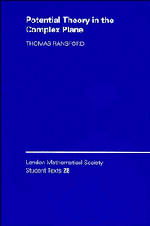Preface
Published online by Cambridge University Press: 06 January 2010
Summary
When first learning potential theory, as a new graduate student, I experienced some difficulty with the literature then available. The choice lay between several excellent but encyclopaedic treatises on the subject, from which it was hard work to extract what was needed, and several equally excellent books on complex variable, each containing a useful chapter on potential theory, but which did not go nearly far enough. This book is an attempt to bridge that gap—indeed it was consciously written as the book that I should have liked to read all those years ago.
Potential theory is the name given to the broad field of analysis encompassing such topics as harmonic and subharmonic functions, the Dirichlet problem, harmonic measure, Green's functions, potentials and capacity. It can be developed in many contexts, ranging from classical potential theory in ℝn and pluripotential theory in ℂn to axiomatic theories in very general spaces. In between there are versions relating to Riemann surfaces and other manifolds, uniform algebras and analytic multifunctions, to say nothing of the connections with Brownian motion and other stochastic processes. However, there is one case which is common to them all: potential theory in the plane. As it contains all the essential ingredients of the subject, yet is relatively easy and quick to treat, it seems to me to be well worth mastering first. This is the subject of the book.
There is also a further goal, hinted at by the use of the word ‘complex’ in the title. It is to emphasize the very close connection between potential theory and complex analysis.
Information
- Type
- Chapter
- Information
- Potential Theory in the Complex Plane , pp. ix - xPublisher: Cambridge University PressPrint publication year: 1995
